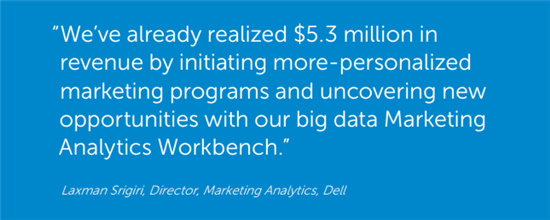This week I am attending our annual Dell World event in Austin, Texas. It is always a favorite event of mine to attend because I get to connect with so many of our customers to not only talk about how they are using Dell technologies to power their companies, but I also get to share with them about our own Dell on Dell story. This year, I'm taking part in many breakouts and panels where I shared our story and one of the hottest topics covered in those sessions has been our Dell strategy for big data. We have many products and solutions in the Dell portfolio that we also use internally to help inform our enterprise by deriving greater insights, or patters, from data for better decision making.
One of the best success stories is our Marketing Analytics Workbench. Our Dell Marketing team needed insight into customers’ changing online and offline behaviors to quickly develop new multichannel marketing models. They needed an easier way to condense insight from numerous business intelligence tools and data sources that hold petabytes of information about customers online and offline shopping habits. We just needed to supply marketing employees an easy to use solution that could assimilate all of it, pinpoint patterns, and make recommendations about marketing spend and activities. So Dell IT and Marketing partnered together and built a big data analytics tool that gives insight into corporate databases, unstructured data such as clickstreams, social media and the return on investment of individual marketing efforts.
It’s basically a highly scalable data mart that utilizes multiple technologies and tools, such as Dell’s Toad Data Point and Dell’s Statistica, to enable different types of data storage, manipulation and augmentation. The Marketing Analytics Workbench increases knowledge about customers, facilitates $5.3 million in revenue by initiating more personalized marketing programs and uncovering new opportunities and saves more than $2.5 M in operational costs by eliminating a multitude of other BI tools.
Toad Data Point, which is one of the technologies in the workbench, is a tool that allows you to easily access, integrate and work with all your big data sources. This powerful, yet easy-to-use, toolset automates routine tasks to save hours each day. It also makes it simple to share analytics with your team and improve data quality and enables business users to access data from almost any source without IT help.
Dell Statistica, another one of the tools in the workbench, is also used by our Dell Global Analytics team that supports over 500 internal clients with end-to-end delivery of predictive modeling projects. These projects support goals such as improving customer acquisition and retention, identifying up sell and cross sell opportunities, increasing revenue and understanding customer lifetime value. The team migrated to Dell Statistica because they felt other tools were just tools for data extraction and processing, while Statistica is truly an advanced analytics platform. They are using Statistica to create a Customer Lifetime Value model for Dell’s storage business unit which allows the team to calculate the risk and return profile of the client’s customer base and thereby provide guidance for maximizing the value of the client’s marketing and sales activities.
Another Dell tool that we use internally is Dell Boomi, the industry’s largest integration platform as a service that syncs data between business-critical applications, either on-premises or in the cloud. Boomi eliminates the costs associated with integrating and maintaining using legacy middleware, appliances or custom code. Using Boomi, you gain rapid time-to-value, easy access to your data whether in the cloud or on-premises and significant cost savings over traditional integration solutions. In Dell IT we have used Boomi to integrate Salesforce instances. Boomi eliminated the costs associated with integrating and maintaining legacy middleware, appliances and custom code. Using Boomi, we gained rapid time-to-value and easy access to our data whether in the cloud or on-premise. We experienced a 75 percent shorter integration time-to-value, and lowered solution TCO up to 30 percent.
As the amount of data in the world keeps increasing, we will continually have to find new ways to analyze that data and use it to derive insights to then help serve our customers. I know that our Dell products and solutions are enabling us now and will enable us in the future to do just this.

